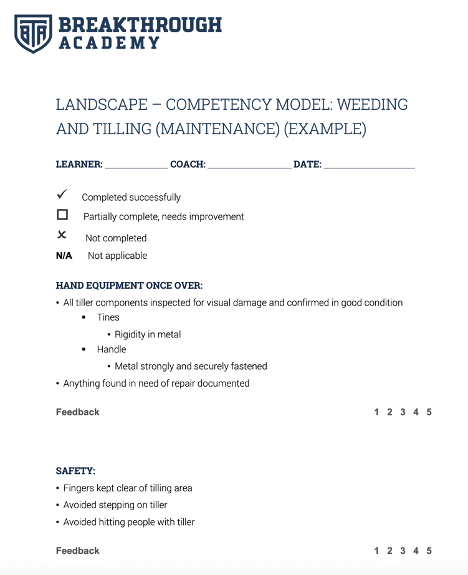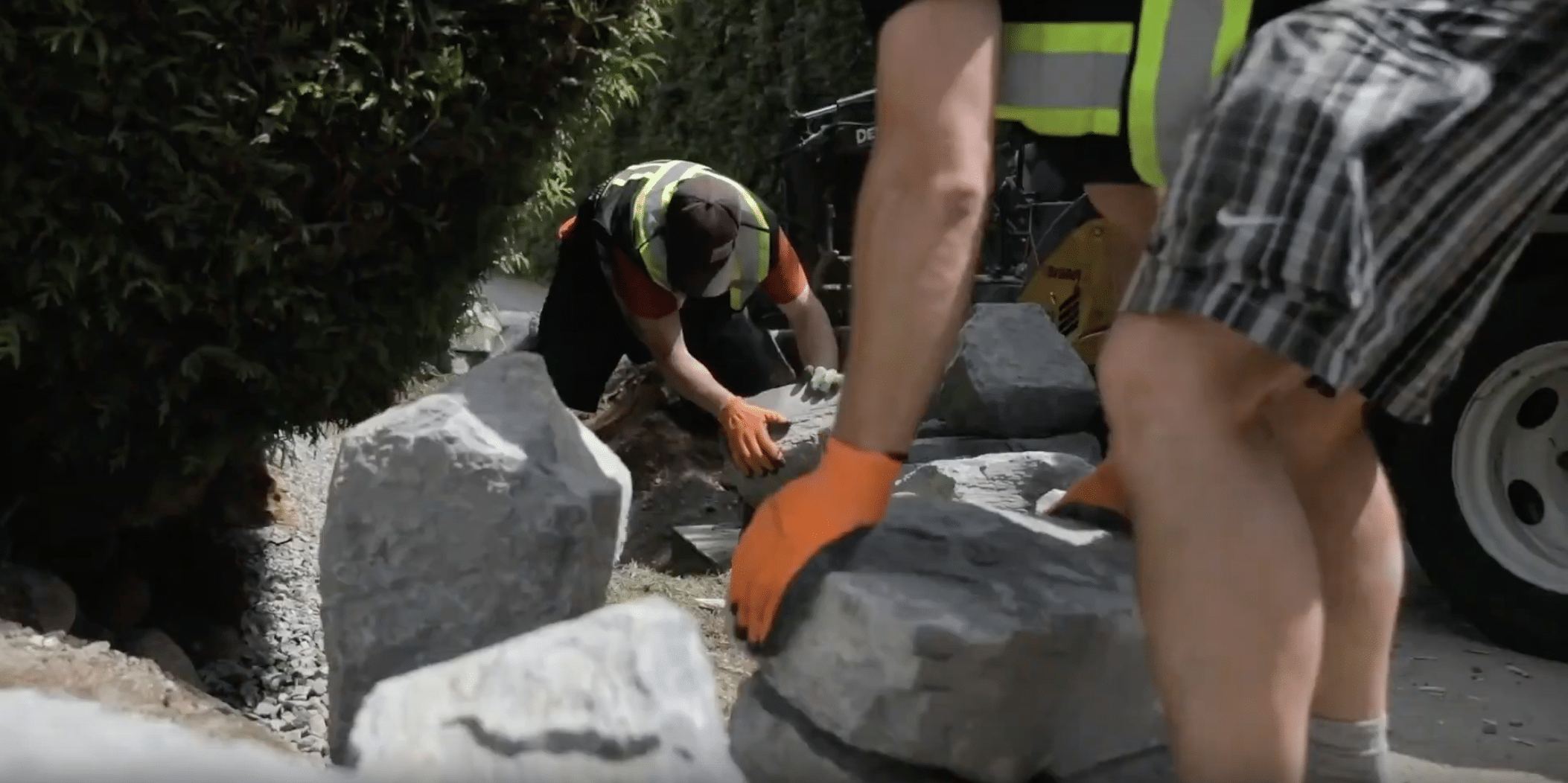Landscape companies ramp up a lot of new people seasonally, and it wouldn’t be unusual for hiring and training to happen right before or even during the busiest time of year. And if you don’t have a super dialed-in training program, you’re left scrambling, dealing with turn-over, and likely managing customer service issues. The price paid is often lost time, revenue, and not to mention the added stress and exhaustion from having to pick up the slack with an unproductive or thin crew.
By this time of year, you’re in the thick of it as a landscaper. You’re busy, your crews are out doing work, and you’re most likely through your training phase. It’s not uncommon for business owners to be scrambling to stay on top of a lot of moving parts, and directly handling issues that arise when training isn’t as effective as it needs to be. And having a landscaper or two quit without notice, all the while having a full production schedule coming up, doesn’t make it any easier to get out of this vicious cycle.
What we know is that 8 times out of 10, the rush to put someone to work without clear training is not going to succeed in the long-run; and there’s nothing worse than having a bad landscaper in your crew. So how do you properly train landscapers to succeed in their role when you don’t already have a proven training system, especially during the busiest time of year? Simply put: you start injecting some quick-wins into your crew training to improve quality.
You Need to Shift from Being Unmethodical to Methodical
Even if your prime training period has come and gone AND you’re in your busiest time of year, you don’t have to keep suffering. You might not have the capacity to implement a perfected training solution just yet, but there are some things you can implement immediately that will have a positive impact on your crew’s productivity, your company’s revenue and culture, not to mention your health and work/life balance.
At Breakthrough Academy we work with hundreds of contractors through a three-year program designed to build profitable, efficient, and resilient companies through proven processes, coaching, and community. Our proven management system and implementations help them transition to a more methodical approach in training, as well as all other aspects of their business. This, along with many other reasons is why LMN has decided to partner with BTA – because we know we’re better together in helping you build a successful landscaping business.
A methodical team training program is a core implementation that every business needs if you want to take your business to the next level and systemize the process of training and scaling with seasonal staff. In order to achieve that, your primary goal is to shift from being unmethodical to methodical.
Below are some examples of unmethodical training.
- New hires are trained at any time.
- There is no training program or competency model in place.
- They are trained at the most convenient sites.
- Training is taught, doing as they go.
- Individual training is prioritized by convenience.
- Learners are taught and then left to do their job.
And below are some examples of methodical training.
- Training is a specific priority.
- Training is strategically planned out in advance.
- Selective training sites are prepared.
- Trainers are thoroughly prepared with a clear breakdown of skill sets.
- Training is focused on those with the highest capabilities.
- Learners are coached and supported over a long period of time.
Now that you have the context of where you are and where you want to be, let’s get busy implementing some solutions right away to get you there.
An Employment Agreement is so much more than a contract. Sure, it outlines the basics like how much someone gets paid, what vacation they are entitled to, and how they must request a sick day. But that agreement should also highlight exactly what is expected of the person you’ve hired and how they’re going to achieve it. If you’ve hired top talent for the right role, those expectations should get them excited. These expectations can be clearly summarized in the form of Deliverables and Accountabilities.
TIP #1: Do a Role Breakdown
A simple place to start is to break down each role, itemizing the critical skills that someone in that role must have. You want your staff focused on the work you expect them to do that drives results; not the many distractions that can manifest on a jobsite. It’s hard to keep people in their lane if they don’t know what it is, so give your people some clarity and let them drive. So begin by creating categories of areas in which your staff will be held accountable, and then list the individual skills required to thrive in that role.
Below are some category examples for a Foreman:
- Customer greeting
- Job planning
- Safety supervision
- Daily inspections
- Daily customer updates
- Supply orders
- Holding accountability to budgets
- Final inspections
- Customer walk arounds
And from there, you’ll want to list the specific tasks that fall under each category.
Below is a simple template to consider using:

An example template to use for completing a role breakdown.
TIP #2: Build Competency Models (aka Skill Checklists)
“How do you know that they know?” is a great question to ask yourself about your staff. You need to be confident that someone has the skill required to do their job in your absence because you cannot be on every jobsite to ensure your crews performance is consistent with your expectations. Over time, you need to be able to consistently and repeatedly watch, analyze and score performance on a skill to know that they know how to execute effectively.
At BTA, we use competency models to create a framework for defining the tasks, skills and knowledge necessary for successful performance in a specific role. We have a ton of examples of landscape skill-based comp models that would make great “quick win tools” for you, if you keep it simple. Using the tasks you defined from tip #1, you need to create a competency model for each role necessary to run your company.
Some examples of this for a lot of maintenance companies would be: excavation, grading, hitching trailers, loading and securing equipment, etc. Next, you need to define the major components within each task (i.e. setup, safety). Then, list the specific steps to execute each task. Lastly, assign each component a 5-point rating that you can observe and rate, where a 5 represents “Rockstar status”, a 3 represents “Competent”, and a 1 represents “We’re in deep trouble.” And voila, you’ve got the makings of a working competency model.
Through our work with landscape contractors at Breakthrough Academy, we’ve created over 20 different competency model templates for the different skills required to run a successful business of all sizes.
Below is an example of a weeding and tilling maintenance competency model:

An example template competency model for weeding & tilling in your landscaping business.
TIP #3: Complete a Daily 4×4 with Your Crew
This is a tool we use with our landscaping companies to ensure things are on track and that there are fewer gaps in training and communication. BTA Members are trained to call it the “Daily 4×4”, whereas LMN calls it the “4 O’Clock 4.” Ultimately, you can call it whatever you want, but the principle remains the same, and this tip is just as crucial as the prior two. Here’s what you do.
Have a daily check-in at 4 PM with 4 agenda Items:
- Review Goals
- Work Completed
- Obstacles/Slow Downs
- What Do You Need?
This ritual is done per crew, daily, and can happen at the start or end of each day, depending on what works best for your company. The crew is responsible for completing the 4X4 and sending that information to the Operations Manager
Here is a sample of what that might look like in practice:
- 1. What are my top 3 goals and priorities for tomorrow?
a) Get soil in
b) Mark out beds
c) Pickup and deliver road base - 2. What did we get completed today?
a) Fill out [1 bin 10 yds]
b) 30 yds delivered [1 load, 15 yds down to backyard] - 3. What is slowing us down?
a) Irrigation guys timing
b) Steep slope and unsettled weather - 4. What do I need from you?
a) INFORMATION: All good
b) MATERIALS: Lighting and wire from shed
c) EQUIPMENT: U17 out, packer in
d) LABOR: 1 guy for soil, 1 for road base leveling and packing
What Else Can You Do to Improve Landscaper Training?
Alright, so you’ve learned how to properly create a role breakdown and then expand that into a working competency model. And you have also learned how to effectively hold your team accountable for daily success. The above tips will definitely help get a streamlined training program into place, which alone can have a significant impact on your business. And remember, if you are slammed with work, it’s OK to focus on building a thinner v1 – it can always be revised to be more detailed when you have the downtime to really focus on it.
But ultimately, if you truly want to take your business to the next level, you need to ensure your staff are highly productive. And that means making ordinary staff exceptional. This is something that BTA excels at and we’re going to teach you how to do it. In next week’s article of this Landscaper Training Series, we’ll specifically teach you how to make ordinary staff exceptional.
And at the end of this series, BTA will be hosting a webinar on How to Increase Staff Productivity Through Summer Production, where Benji Carlson will walk you through BTA’s tried-and-true goal setting and review process for landscapers. You’ll also get free templates and frameworks to use, so you can begin increasing productivity immediately without having to build your own system first. Make sure you register below so that you have the tools necessary to amp-up your team’s productivity.

Live Webinar
Increasing Staff Productivity Through Summer Production
Benji Carlson, Assessment Specialist from Breakthrough Academy
June 11, 2020 12:00 PM – 1:00 PM EDT




